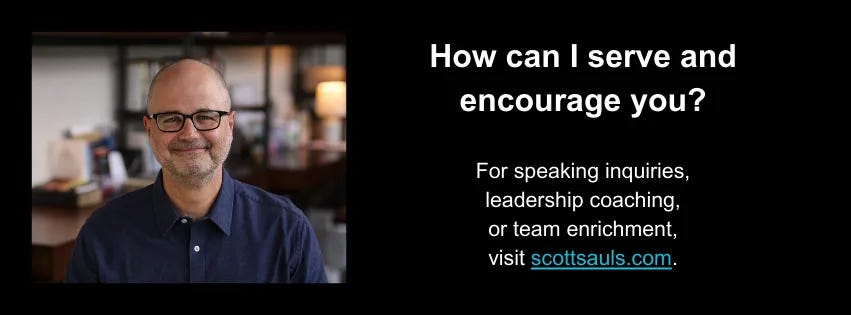Some People Fear Hell - Others Have Already Been There
Religion, Spirituality, and the God Who is There at Rock Bottom
A good friend of mine—someone I love very much and deeply respect—recently shared something that caught me off guard in the best way. He’s someone who has been stuck the mire of addiction and found healing through Christ and the path of 12-step recovery. Speaking from that place of hard-won wisdom, he said:
"Religion is for people who are afraid to go to hell. Spirituality is for people who have already been there and want a better way."
To some, his words might sound provocative, even unsettling. Was he saying that religion doesn’t matter? Was he suggesting that spirituality—whatever we mean by that—is the real answer?
Not exactly.
What he was doing was pointing out a distinction that’s important for all of us to understand. There is a way of approaching God that’s rooted in fear, performance, and keeping up appearances. It’s an approach that says, "If I do more good than bad, and if I avoid getting myself in trouble, then everything—including me—will be okay.” That’s what we mean here by religion.
New Video Teaching:
To complement your reading with related video teaching that further expands on this essay, here’s the latest:
When You Can’t Fix You: Why God Helps Only Those Who Can’t Help Themselves
(Essay continued…)
But there’s also another way—the way of the broken, the contrite, and the humble. It’s the way of those who know what it feels like to try and fail. It’s for those who know they have missed the mark, who have come to the end of themselves, who have hit rock bottom, and who have learned that self-sufficiency is a dead-end street and that connection with God and others is the answer to all of that. That’s what me mean here by spirituality.
And here is the wonderful news of the gospel:
Jesus Christ came precisely for those of us who do not have our acts together and who have not arrived and who will never not be in recovery, and who humbly and openly recognize it.
He came for those who know they cannot reach God on their own and have put themselves into his hands.
At one church where I served as pastor, we would remind ourselves of this often by reciting the following together:
Pastor: For whom did Jesus come?
Community: Jesus came not for the strong, but for the weak; not for the righteous, but for sinners; not for the self-sufficient, but for those who know they need rescue: To all who are weary and need rest; to all who mourn and long for comfort; to all who feel worthless and wonder if God even cares; to all who are weak and frail and desire strength; to all who sin and need a Savior—Jesus welcomes into his circle, adopts into his family, and reserves a place at his Table—for he is the mighty friend of sinners, the ally of his enemies, the defender of the indefensible, and the justifier of those who have no excuses left.
This isn’t just about people who are willing to tell their addiction stories.
It’s actually about all of us.The Great Physician and the End of Self-Sufficiency
In an interview with French journalist Michka Assayas, Bono—the lead singer of U2—spoke candidly about his faith. He talked about grace, about how Christianity is not about earning our way to God but about receiving what has already been done for us in Jesus.
Bono’s words carried the weight of a man who had lived enough life to be in touch with his own need. He didn’t try to sugarcoat anything. He admitted his flaws, his failures, his moments of despair. At one point, he said something that echoes what Jesus Himself said:
"You see, at the center of all religions is the idea of Karma. You know, what you put out comes back to you… Yet, along comes this idea called Grace to upend all that… Love interrupts, if you like, the consequences of your actions, which in my case is very good news because I’ve done a lot of stupid stuff."
Bono was naming what so many of us know to be true in our own stories: we do not need more karma (religion, performance, image, etc.); we need grace. We do not need more rulekeeping; we need rescue.
Jesus once said, “It is not the healthy who need a doctor, but the sick. I have not come to call the righteous, but sinners to repentance” (Luke 5:31-32).
These words are as radical today as they were when Jesus first spoke them. We like to think of ourselves as strong, capable, and self-sufficient. But the truth is, we are all in need of healing.
This is why my mentor and friend, Chip Dodd, often says that there are in reality only two kinds of people in the world:
Addicts who are in recovery, and
Addicts who are not in recovery.
Addiction is not just about substances. It’s about our shared human condition. Some of us turn to alcohol, drugs, social media, or gambling to fill the hole in our hearts. Others turn to work, achievement, approval, control, money, or self-righteousness. We all have ways of coping with the ache inside, ways of escaping the reality of our need, ways of avoiding God.
If Chip’s statement is true, then my friend’s quote that began this article becomes even more relevant. If all of us, at some level, have “been to hell” in our own way and by our own choosing, then we are all in need of a better way.
And the good news is, Jesus not only provides that way; He is that way.
A Better Way for All of Us
One of the greatest things about Jesus is that He rarely sought out the people who thought or behaved as if they had it all together. He wasn’t particularly drawn to the impressive, the powerful, or the religiously accomplished. Instead, He gravitated toward the ones who had reached the end of themselves.
When others avoided the broken, Jesus moved toward them.
When others condemned, He forgave.
When others saw failure, He saw potential—a hope and a future.
The people who found healing in Jesus were most often the ones willing to own their need:
A promiscuous woman, condemned by the religious elite,
whom Jesus dignified, forgave, and restored.A tax collector, despised and rejected by his own people,
whom Jesus called by name and invited into a new life.A criminal on a cross, who had nothing to offer but a plea for mercy,
whom Jesus welcomed into paradise.
These were not the ones who had worked hard to earn God’s love. These were the ones who knew they had nothing to offer—except their need.
Bono, in that same interview, put it this way:
"You ask me what I think of Jesus. Jesus was either a liar or a madman, or He was who He said He was. And we have to make a choice on that… And I believe that Jesus took on the sins of the world so that what we have done does not come back to us. That’s why grace is so amazing."
This is what separates Christianity—or what Francis Schaeffer called “true spirituality”—from every other way of looking at the world. It is not about self-improvement and image management. It’s not about being better-than. It is not about climbing a ladder to God. It is about God coming down to us.
So when Jesus says, “Come to me, all you who are weary and burdened, and I will give you rest” (Matthew 11:28), He is not speaking to the elite or the put-together. He is speaking to those who have empty hands and beggar’s hearts.
He doesn’t say, “Come to me once you’ve figured things out.” He doesn’t say, “Come to me once you’ve cleaned up your life.”
Instead, He simply says, “Come to me.”
And when we do, we find what we have been looking for all along (see what I did there?)—not a rigid system of rules, not a God who is waiting to punish, but a Savior who loves us, who meets us in our brokenness, and who leads us into healing and freedom.
A better way isn’t just possible.
It’s already been made for us.
His name is Jesus.






Amen
Yes! Beautiful! Amen! Come, Lord Jesus!